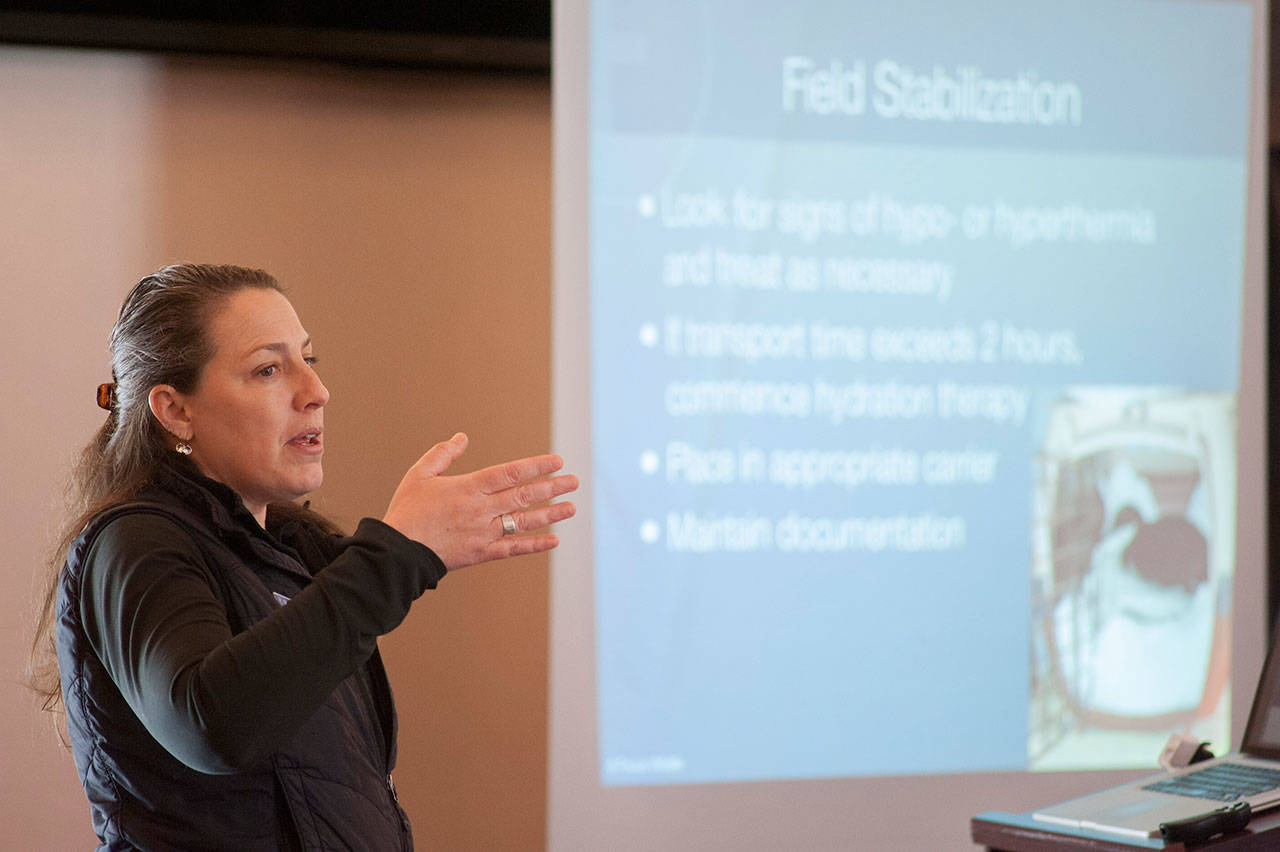The Clallam County Marine Resources Committee, Surfrider Foundation and Focus Wildlife will offer a free training class in oiled wildlife response from 8 a.m.-5 p.m. Saturday, April 27, at Pioneer Memorial Park in Sequim.
Taught by Jenny Schlieps, program manager for Focus Wildlife, the class will focus on the importance of wildlife rehabilitation, impacts on and care of wildlife during an oil spill and how volunteers can safely help with these efforts.
“Prompt capture and care of oiled wildlife can significantly increase their chances of survival and trained volunteers are an important part of the process,” Schlieps said.
Online registration is available at www.clallamcountymrc.org or by email to handerson@co.clallam.wa.us.
Jeff Ward, chair of the Clallam Marine Resources Committee, said the expansion of oil transshipment facilities in British Columbia could mean a seven-fold increase in tanker traffic through Haro Strait and the Strait of Juan de Fuca.
“We all hope a major oil spill will not occur, but if it does, trained volunteers working with professional oiled wildlife responders can result in better wildlife care and ultimately a higher percentage returned to the wild,” Ward said.
In December 1985, the Arco Anchorage spilled 238,000 gallons of crude oil into Port Angeles Harbor that spread throughout the Strait of Juan de Fuca. Three years later in December 1988, a ship collision with the fuel barge Nestucca spilled more than 230,000 gallons of No. 6 fuel oil into the Pacific Ocean near Grays Harbor; the resulting oil slick dispersed more than 800 square miles from Grays Harbor north to Vancouver Island, B.C., and south to Oregon.
Another accident occurred in 1991 when the Japanese fishing vessel Tenyo Maru sank about 20 miles northwest of Cape Flattery after colliding with a Chinese freighter. Beaches were fouled with oil from Vancouver Island, B.C., to northern Oregon, with the heaviest oiling occurring along the Makah Nation reservation and Olympic National Park shoreline.
All three spills resulted in significant numbers of oiled seabirds.
Arnold Schouten, owner of Dry Creek Waterfowl Sanctuary, participated in seabird rescue in all three spill events and remembered the challenges they faced.
“We did what we could with what we had at the time,” Schouten said. “The Arco Anchorage spill occurred during Christmas break for the Port Angeles School District. A care center was set up at the high school. Great care was taken to protect the wooden gym floor and locker rooms and showers were used for washing the birds. The entire operation had to be relocated to a nearby warehouse when school resumed.”
During the Nestucca spill, Schouten said, local Neah Bay volunteers and the Makah tribal community helped solve a water quality problem that improved the way birds were washed.
“Tribal members and citizens living on the peninsula turned out in big numbers to help,” Schouten said. “The public support and participation during all three spills was amazing.”
Using the lessons learned from earlier spills, Washington state resource agencies, professional response organizations and the U.S. Coast Guard work collaboratively to improve oil spill response capabilities along the Strait of Juan de Fuca and around Washington.
Oiled wildlife response shelters owned and maintained by Clean Rivers LLC, National Response Corporation and Marine Spill Response Corporation can now be deployed anywhere within Washington within 24 hours of a significant oil spill event.
These oiled wildlife “M*A*S*H” units are fully self-contained and are capable of treating hundreds of oiled birds.
“The progress we have made in caring for oiled wildlife since the 1980s has been substantial,” Schlieps said. “And Washington state has made oil spill preparation and response a high priority.”



